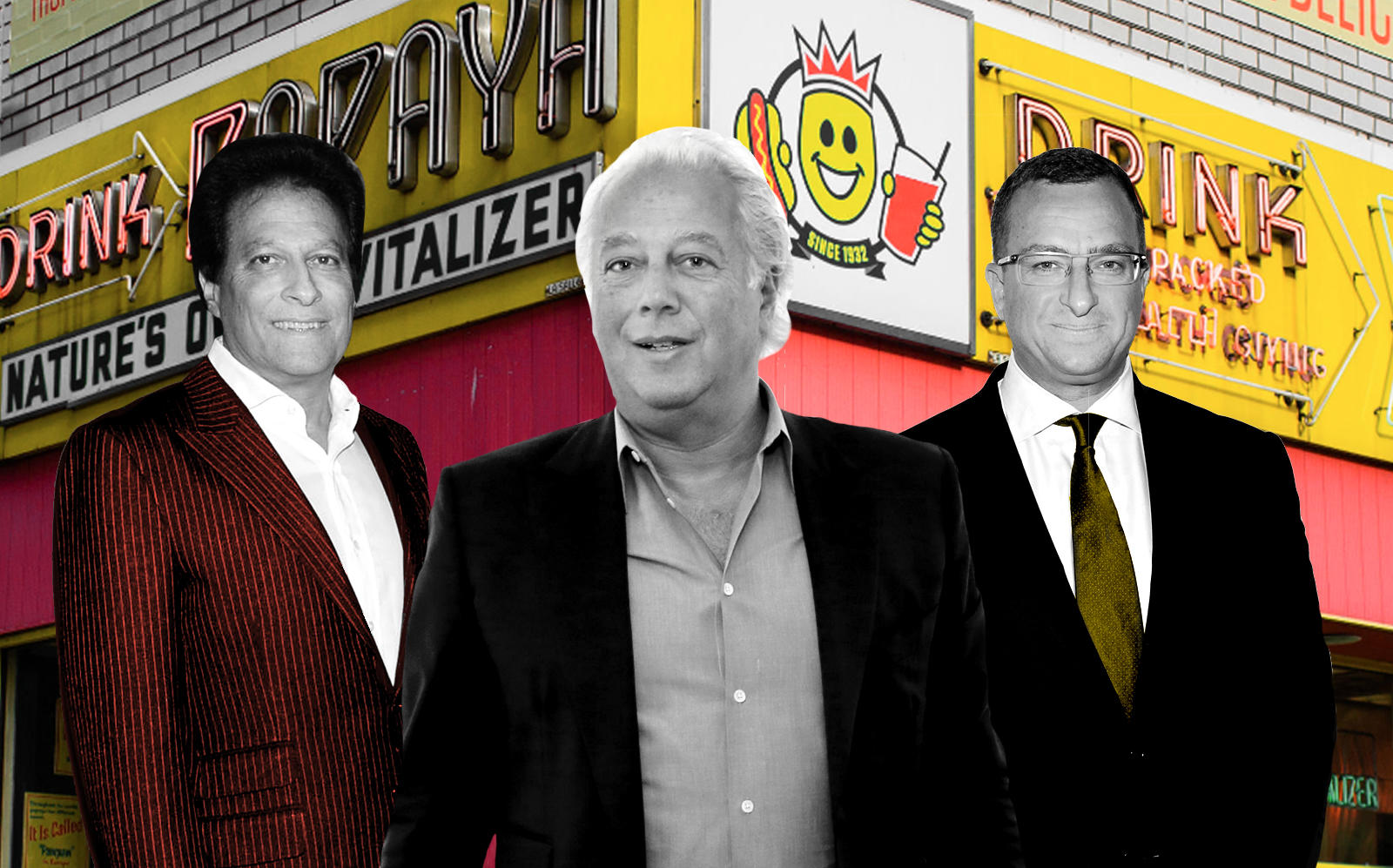 Breakups, bad neighbors and raw sewage: 2019’s juiciest lawsuits
Breakups, bad neighbors and raw sewage: 2019’s juiciest lawsuits
Trending
Condos, conspiracies and coronavirus: 2020’s juiciest lawsuits
Pandemic and economic woes gave litigious industry an extra jolt in uncertain year

An unprecedented pandemic and economic downturn made 2020 a big year for real estate lawsuits.
Sometimes, coronavirus was just one more complicating factor in an already difficult situation — be it softness in New York’s condo market, long-standing headwinds in the retail sector or business relationships gone sour. In other cases, the pandemic was the main cause for a legal confrontation. Still, some lawsuits were the kind you would expect the city’s high-stakes real estate world to produce even in a normal year.
Here were the juiciest lawsuits in 2020.
Condo crunch
HFZ Capital Group — the prolific firm co-founded by Ziel Feldman and Nir Meir 15 years ago — may be the first big Manhattan developer in the Covid era at risk of losing it all. As detailed in The Real Deal’s December magazine, the company’s investors and lenders have sued to collect more than $300 million. Liens from contractors and vendors are piling up. And construction has stalled and sales are slow at the firm’s flagship project, the Bjarke Ingels–designed XI condo and hotel along the High Line.
Mortgage maneuvers
In 2014, RFR Holding teamed up with Vanke US to develop a luxury condo project at 100 East 53rd Street, as Aby Rosen’s firm hoped to leverage the Chinese developer’s “sales and marketing channels overseas” to attract buyers. But the market turned, and with a loan from the Industrial and Commercial Bank of China now in default, Rosen accuses Vanke of orchestrating an improper “backdoor deal” that put it “on both sides of the borrower-lender relationship.” Vanke, for its part, claims Rosen is seeking an exorbitant buyout for its 7-percent stake — a scheme that had allegedly begun before the pandemic.
Air rights reversal
In 2016, Sharif El-Gamal’s Soho Properties merged two zoning lots at the former so-called “Ground Zero mosque” site to pave the way for a 43-story condo project at 45 Park Place. After a series of setbacks, however, its consortium of overseas lenders is now seeking to foreclose on the project — and claims that the developer is threatening to undo the merger, removing 40,000 square feet of rights from the nearly completed condo tower and drastically reducing its value. El-Gamal denies this, and says that his firm no longer controls both parcels.
(Former) family feud
The long-running legal feud between Alex Sapir and Rotem Rosen saw some new twists in 2020, as the former business partners and brothers-in-law traded lawsuits a week apart in late July. First, Sapir and his family firm brought a $100 million suit against Rosen and his brother Omer, accusing them of conspiring to steal documents and trade secrets from the family. Rosen responded with a suit alleging that Sapir defaulted on a $60 million promissory note.
Nuclear deterrence
The Gindi family, which founded Century 21, are passive investors in seven of Ben Ashkenazy’s North American properties, a pair of recent lawsuits revealed. Ashkenazy alleges that the Gindis refused to meet a contractual obligation to invest millions in the properties to stave off a bankruptcy. He further claimed the Gindis damaged his reputation by telling other real estate players that he stole money from them. The Gindis, for their part, say that Ashkenzay threatened to “go nuclear if I need to because you destroyed my business.”
Merchant masquerade
After a two-year prison stint in connection with a $18 million fraud, Adam Hochfelder joined Merchants Hospitality in 2012 to spearhead acquisitions and development for the firm. But now, Merchants accuses Hochfelder of embezzling funds from its West 42nd Street hotel project — the site of a failed effort to run a high-priced Playboy Club in New York — and using his affiliation with the firm to run a $400,000 Ponzi scheme through his company email. Merchants and Hochfelder briefly agreed to discontinue the suit voluntarily, but the deal fell through a few days later. Hochfelder denies all charges, including allegations of drug use and psychological issues.
Weapons @ WeWork
A federal lawsuit filed in July accuses WeWork of bungling its response to a complaint that a mid-level manager regularly wielded weapons (including knives and a crossbow) at the office and on Zoom calls, bragged of ties to the mafia and had a reputation for making unwanted advances on female staff and clients. Rather than rectify the situation, the lawsuit claims that WeWork used the excuse of economic harm caused by Covid-19 to terminate the plaintiff, who was employed at the co-working firm’s New York office and raised the issues with management.
Papaya problems
Iconic hot dog chain Papaya King found itself in dire financial straits in late 2019, and hired Grab & Go Convenience to manage its two remaining Manhattan locations and get the company back on its feet. In a May lawsuit, however, the chain claims that Grab & Go broke into the store at 179 East 86th Street and continued to operate without permission in the midst of the coronavirus lockdown, even though Papaya King’s lease had been canceled after the eatery racked up more than $122,000 in unpaid rent. The management company — which now claims to own Papaya King — allegedly caused a sewage backup and flood in the basement of a neighboring pizzeria and is also dealing with another legal dispute at the now-shuttered Midtown location.
Now UCC me, now you don’t
In May, Hidrock Properties accused Henry Silverman’s 54 Madison Partners of trying to take over the 161-key project at 12 East 48th Street his firm lent $30 million in mezzanine debt on. Hidrock referred to it as an “improper and shameless attempt to capitalize on the Covid-19 pandemic.” Silverman’s firm allegedly announced an in-person “public” auction of the entity that controls the property at the MetLife Building on Friday, May 1 — despite the ban on non-essential gatherings in effect at the time, according to the suit. Two weeks later, a judge ruled that mezzanine loans were not subject to the state ban on foreclosures. The auction went forward soon after, but Hidrock filed a new suit in July, arguing that it was a “sham” and “commercially unreasonable.”
Honorable mentions:
Covid chaos, continued
The coronavirus era’s new normal led to the rise of entire genres of unprecedented lawsuits. Most notably, countless commercial tenants — from apparel retailers to rock-climbing gyms — came to the legal conclusion that the pandemic “frustrated” the purpose of their leases, allowing them to walk away without penalty. So far, courts have not shared this view.
Others directed their grievances at the city and state governments for imposing what they viewed as unreasonable restrictions. These began to pile up in the autumn as some businesses were made to stay closed while others began reopening. In one suit, a Brooklyn ale house lampooned Covid curfews, observing that the virus “does not behave as a vampire, infecting others only when the moon is out.” Religious groups in second-wave hotspots also filed several suits challenging new restrictions.
New pandemic rules also opened up new real estate for retailers to fight over — the sidewalks. In one instance, a restaurant at the Mark Hotel on the Upper East Side found itself in a dispute with the clothing store next door, which claims it was rendered “invisible” by the restaurant’s outdoor dining set-up.
“Saliva-spewing” picketers
SL Green Realty sued Local 79, but not over a labor dispute. The real estate investment trust said that picketers from the union outside its 420 Lexington Avenue office failed to wear face masks and were using “saliva-spewing whistles” — putting building guards and the public at risk of contracting Covid-19. SL Green said it submitted video evidence of the “saliva projectiles.”
Read more
 Breakups, bad neighbors and raw sewage: 2019’s juiciest lawsuits
Breakups, bad neighbors and raw sewage: 2019’s juiciest lawsuits
 The 10 most notable New York real estate lawsuits of 2018
The 10 most notable New York real estate lawsuits of 2018




